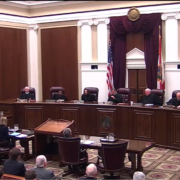Proposed Collaborative Divorce Professional Conduct Rule Published in Florida Bar News
In March of 2016, Florida Governor Rick Scott signed into law the Collaborative Law Process Act (“CLPA”). The CLPA, among other things, protects communications within the collaborative process so that participants can be more open in their discussions and can rest assured that proposals and comments made while trying to reach agreement cannot later be used against them.
However, the CLPA does not go into effect until after the Florida Supreme Court adopts Rules of Professional Conduct and Rules of Procedure.

Proposed rules have been approved by the Florida Board of Governors, and they have been published in the August 15, 2016 edition of the Florida Bar News for comment. Once the comment period is over, the Florida Supreme Court will determine whether it will approve the rules.
You can find the proposed Rule of Professional Conduct (4-1.19) after the jump (the proposed Rule of Procedure is published in a separate post):
RULE 4-1.19 COLLABORATIVE LAW PROCESS IN FAMILY LAW
(a) Duty to Explain Process to Prospective Client. A lawyer must obtain the informed consent of a prospective client in a family law matter to proceed in the collaborative law process after providing the prospective client with sufficient information about the collaborative law process, including, but not limited to, the following:
(1) the benefits and risks of the collaborative law process to resolve a family law matter;
(2) the nature and scope of the matter to be resolved through the collaborative law process;
(3) the material benefits and risks of participating in the collaborative law process;
(4) alternatives to the collaborative law process;
(5) that participation in the collaborative law process is voluntary and any client may unilaterally terminate the collaborative law process for any reason;
(6) that the collaborative law process will terminate if any participating client initiates a proceeding or seeks tribunal intervention in a pending proceeding related to the collaborative law matter after the clients have signed the collaborative law agreement; and
(7) limitations on the lawyer’s participation in subsequent proceedings imposed by family law court rules on the collaborative law process.
(b) Written Agreement Required. A lawyer is prohibited from representing a client in the collaborative process in a family law matter unless all participating lawyers and clients sign a written agreement that includes:
(1) a statement of the clients’ intent to resolve a matter through the collaborative law process under these rules;
(2) a description of the nature and scope of the matter;
(3) identification of the lawyers participating in the collaborative law process and which client(s) they represent;
(4) that the clients will make timely, full, candid and informal disclosure of information related to the collaborative matter without formal discovery and will promptly update previously disclosed information that has materially changed;
(5) that participation in the collaborative law process is voluntary and any client may unilaterally terminate the collaborative law process for any reason;
(6) that the collaborative law process will terminate if any participating client initiates a proceeding or seeks tribunal intervention in a pending proceeding related to the collaborative law matter after the clients have signed the collaborative law agreement; and
(7) that the clients understand that their lawyers may not represent the clients or any other person before a tribunal in a proceeding related to the collaborative law matter except as provided by court rule.
(c) Duty to Address Domestic Violence. A lawyer must reasonably inquire whether a prospective client has a history of any coercive or violent relationship with another party in a family law matter before agreeing to represent a client in the collaborative law process and must make reasonable efforts to continue to assess whether a coercive or violent relationship exists between parties in a family law matter throughout the collaborative law process. A lawyer may not represent a client in the collaborative law process in a family law matter and must terminate the client-lawyer relationship in an existing collaborative law process in a family law matter if the lawyer reasonably believes that the lawyer’s client has a history of any coercive or violent relationship with another party in the matter unless:
(1) the client requests to begin or continue the collaborative law process; and
(2) the lawyer reasonably believes that the safety of the client can be protected during the collaborative law process.
Comment
The collaborative law process involves the nonadversarial resolution of disputes through voluntary settlement procedures. Florida statutes and court rules permit collaborative law to resolve disputes in family law. Lawyers engaging in the collaborative law process in family law matters must comply with legislative and court requirements regarding the process. As part of this nonadversarial and voluntary resolution of disputes, lawyers who engage in the collaborative law process in a family law matter, and any other lawyers in that lawyer’s firm, may not afterwards represent any party in any related proceeding except to request that a court approve the settlement reached during the collaborative law process or in specified emergency situations in accordance with family law court rules.
Before agreeing with the client to proceed in the collaborative law process in a family law matter, a lawyer should first consider whether a prospective client is an appropriate candidate for the collaborative law process and must provide the prospective client with sufficient information regarding the benefits and risks of the process, including the lawyer’s limitations regarding subsequent proceedings. See also rules 4-1.4 and 4-1.2. To determine whether a prospective client is a good candidate for the collaborative law process, the lawyer must inquire regarding any history of coercive or violent relationships with any other persons who would be parties to the collaborative law process in the family law matter. See also rules 4-1.1 and 4-1.2. The lawyer also must provide the prospective client with information about other reasonably available alternatives to resolve the family law matter, which may include litigation, mediation, arbitration, or expert evaluation. See also rule 4-1.4. The lawyer should assess whether the prospective client is likely to cooperate in voluntary discovery and discuss that process with the prospective client. See rules 4-1.1 and 4-1.2. The lawyer should also advise the prospective client that the collaborative law process will terminate if any party initiates litigation or other court intervention in the matter after signing a collaborative law agreement. Id. The lawyer should discuss with the client the fact that the collaborative law process is voluntary and any party to a collaborative law agreement may terminate the process at any time. Id.
An agreement between a lawyer and client to engage in the collaborative law process is a form of limited representation which must comply with all requirements of limited scope representations, including the requirement that the client must give informed consent in writing. See rule 4-1.2(c). The agreement between lawyer and client should include the nature and scope of the matter to be resolved through the collaborative law process, the material benefits and risks to participating in the collaborative law process, and the limitations on the lawyer’s representation.
If a client agrees to participate in the collaborative law process and then terminates the process or initiates litigation regarding the dispute, the lawyer should terminate the representation. See rule 4-1.16.
If you have questions regarding how your family could better resolve its disputes via the collaborative family law process, schedule a consultation with Family Diplomacy: A Collaborative Law Firm at (813) 443-0615 or CLICK HERE to fill out our consultation form.
Adam B. Cordover is co-author of an upcoming American Bar Association book on Building A Successful Collaborative Practice. He is former president of Next Generation Divorce, a Board Member of the Florida Academy of Collaborative Professionals, and on the Research Committee of the International Academy of Collaborative Professionals.







Trackbacks & Pingbacks
[…] You can find the proposed Family Law Rule of Procedure (12.475) after the jump (the Rule of Conduct is published in a separate post): […]
Leave a Reply
Want to join the discussion?Feel free to contribute!